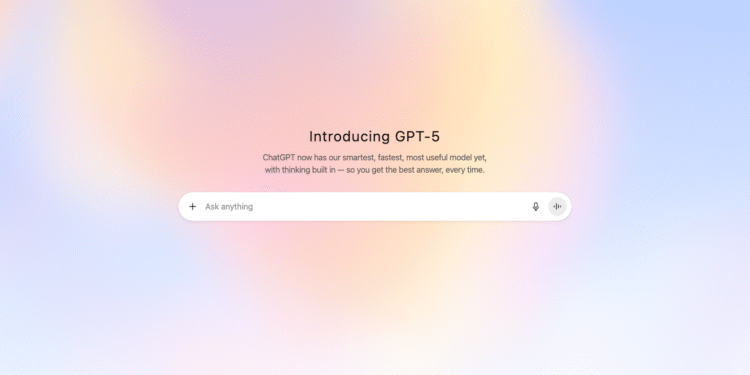Table of Contents
The fifth iteration of ChatGPT by OpenAI is their newest language model. They claim it is designed to be more efficient, smarter, and faster than its predecessors.
The new revisions better enable prevention of damaging outputs and memory, a welcome improvement to the overall user experience. It is able to enable more sophisticated conversations and provide capable expert-level support, especially for writing and coding.
The latest enhancements also improve the memory and user interface of ChatGPT 5. It can now provide a better and clearer response to an expanded range of queries. Having batteries with a toolbox the AI can Switch between to assist the user in real time improves it in serving their needs better.
Along with improved integration of various tools, the model provides more flexibility, flexibility, and privacy to various workflows, building upon the trust already developed by its users.
Key Takeaways
* The AI ChatGPT 5 learns new dialogues in real time.
* All of its answers irrespective of the task have reduced risk and quicker responsiveness.
* There is improved tool support and better protection for sensitive data.
Overview of Chat GPT 5 Features
Top Features
Coding: Evolves to a new level of competence, particularly in developing well-designed and responsive front-end user interfaces and debugging large codebases. Early testers praised its improved aesthetic sense, with improved spacing, typography, and overall design.
Creative Writing: Provides stronger, more expressive writing assistance—capable of taking rough concepts and rendering them finished, emotionally engaging text with literary sophistication.
Health Guidance: Offers more precise, accurate, and context-sensitive answers. It behaves more like a considerate partner—raising red flags and assisting users in comprehending their health experience (without supplanting expert medical recommendations)
In terms of its comprehension of reasoning and internal design, Chat GPT 5 has made significant improvements that enhance productivity and precision. It is better in understanding and responding to complex questions and in its systematic architecture. Mundane and complex activities are easier to accomplish due to these improvements.

Core Improvements Over Previous Versions
The system of GPT-5 currently integrates reasoning and multimodal capabilities into a single architecture to enhance efficiency. Previous models are integrated into this system which enhance internal decision-making but contribute to efficiency. A router assigns each subprocess to a request in real-time based on its complexity, its tools, and intention of the user.
All advancements help GPT-5 achieve balance between analysis and speed. In addition, the model also possesses real-time adaptability, through which a greater variety of tasks can be executed more effectively. These modes of real-time adaptability are established on previous advances and are more focused on flexibility and resource usage.
Model Architecture Enhancements
GPT-5’s architecture enhances efficiency by consolidating reasoning and multimodal capabilities into a single system. This structure takes the strengths of previous models and optimizes decision-making internally. The real-time router sends every request to the appropriate subprocess in terms of complexity, tools required, or stated user intent.
These improvements assist GPT-5 in balancing speed and thorough examination. The model dynamically adjusts so that it is able to perform a broader variety of tasks without losing speed or accuracy. This builds upon earlier improvements but has greater emphasis on flexibility and utilization.
GPT-5 is faster than its previous versions, cutting down on the waiting time for answers. The model’s improvements in processing also enhance precision, particularly for complex queries with multi-step reasoning. Such a combination enables users to receive accurate answers in less time.
Speed and Accuracy Boosts
The system employs ongoing training on actual interactions to improve how it routes and responds to prompts. This results in improved performance between topics and minimizes the possibility of mistakes or misinterpretation. The speed gains also enable real-time functionalities like web browsing and image analysis for more interactive purposes.
Advanced Natural Language Processing
This version of ChatGPT uses more advanced language skills to better understand and generate text. It manages multiple languages, tracks long conversations, and handles subtle differences in meaning with improved precision.
Multilingual Comprehension
ChatGPT 5 successfully supports numerous languages so that it can comprehend and respond exactly in various linguistic settings. It now copes more effectively with idioms, slang, and local dialects. Users can change languages during a conversation without losing meaning.
The model is able to translate and interpret intricate sentences, thus easing communication for worldwide users. Its enhanced training on diverse language data lowers the chances of errors and cumbersome sentence construction in non-English inputs. Its multilingual functionality makes it beneficial for global applications and mixed audiences.

Contextual Awareness
ChatGPT 5 employs a wider context window to recall and relate earlier parts of a conversation. This allows it to preserve topic continuity and prevent duplicate information in longer conversations.
The AI can follow subtle hints, such as pronouns or earlier assertions, to return more pertinent responses. It also updates its answers when given new information, unveiling a step-by-step reasoning process. This better understanding enables more sophisticated and natural-sounding interactions.
Nuanced Conversation Handling
The model can determine subtle emotional tone and purpose in conversational exchange. It adjusts its style and content to match the mood of the user or the gravity of the situation.
ChatGPT 5 reduces excessive use of emojis or superfluous agreements, answering with more reflective and balanced speech. This makes the conversational exchange less robotic and natural. It is also able to feel when a blunt response is not appropriate and instead offer explanations or clarifications.
New Personalization Capabilities
ChatGPT 5 comes with capabilities to assist in personalizing interactions for every user. It learns from saved preferences and alters the style and content of responses during the course of time. These are abilities that provide a more personalized experience without constant user input.
User Profile Integration
ChatGPT 5 employs user profile integration to retain basic preferences and interaction history. This enables the model to recall specifics such as preferred topics, writing style, or tone. The user can establish these once, and the AI will implement them on subsequent conversations automatically.
Profiles contain information on language style, level of detail, and formatting preferences like lists or summaries. This makes communication efficient, ensuring answers are tailored to each individual’s requirements. The feature respects privacy as stored information remains secure and is only utilized to enhance conversations.
Adaptive Response Mechanisms
The model also makes adjustments in real time, responding to cues within conversation. It senses shifts in tone, complexity, or topic and changes its answers accordingly. That is, it can shift between formal and informal language or provide more elaborate explanations as necessary.
Adaptive mechanisms also assist in problem-solving operations, wherein ChatGPT 5 employs deeper thinking when the user poses complex questions. This dynamic adapting smooths out interactions and makes them more relevant, with decreased requirements for endless clarifications.
Bigger Integration and Confluence
ChatGPT 5 provides tighter integrations with other applications and services, enabling it to integrate harmoniously with various workflows. It makes smoother communication with various platforms and opens up its reach through the use of the cloud.
API Enhancements
ChatGPT 5’s API now supports a much wider window of context. It can process up to 400,000 tokens, allowing developers to submit more detailed inputs and get more complete outputs. This enhancement makes tasks requiring deep understanding or lengthy conversation better.
The API also works more seamlessly with third-party tools. It is able to draw data from several sources and utilize the data in real-time. This simplifies complex, data-driven applications without having to change programs.
Third-Party Platform Compatibility
ChatGPT 5 complements large third-party platforms such as email clients, spreadsheets, and project management software. It is able to automatically extract data from these applications and utilize it in conversation or analysis.
This compatibility allows users to link ChatGPT 5 with current systems for applications such as summarizing emails, refreshing documents, or creating reports. The model adjusts its output based on the demands of the platform to make these integrations smoother and more efficient.
Cloud-Based Features
Cloud integration allows ChatGPT 5 to save and retrieve a lot of data safely between sessions. This feature is useful for longer-term projects and collaboration by storing contextual data that the AI can access when it needs to.
Cloud features also enable quicker responses during high-demand situations. People get access to speed and reliability enhancements since the model can dynamically scale resources. This smoothens the experience for both light users and companies dealing with numerous requests.
Privacy and Security Improvements
ChatGPT-5 has more robust provisions for safeguarding user information and better facilitating users’ control over their information. These modifications are aimed at preventing data from being misused and at facilitating users’ understanding and management of privacy levels.
Data Protection Protocols
ChatGPT-5 employs advanced encryption to protect data both during storage and transmission. This minimizes the potential for unauthorized access. OpenAI also has enhanced mechanisms in place to identify and prevent malicious content or abuse.
The model further restricts the amount of personal data it retains. Data retention policies are tighter, retaining users’ details only for so long as is required to enhance service quality. Regular security audits and updates are the protocol to repair vulnerabilities on time. This is done to minimize threats from hacking or data loss.
User Transparency Tools
Tools have been incorporated by OpenAI into ChatGPT-5 to present users with information on what data is being gathered and for what purpose. The users can easily check, download, or remove their conversation history by modifying simple settings.
Users are also given control over memory features. They can decide if the AI remembers past interactions, which helps manage privacy during long-term use. Clear privacy notices explain how data is handled in straightforward language. These tools ensure users stay informed and make choices about their data confidently.
Conclusion
GPT-5 represents a major leap in AI intelligence—melding speed and depth into a unified, adaptive system. It raises the bar across writing, coding, health, multimodal understanding, and beyond, while delivering smarter, safer, and more human-like responses.
Follow InsiderXP for latest Tech updates.















